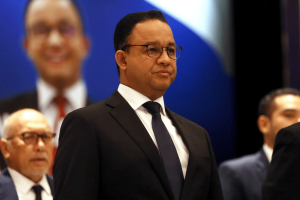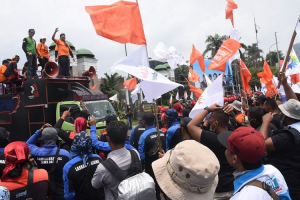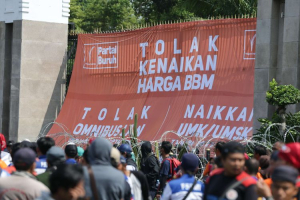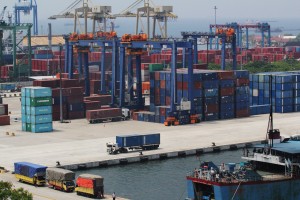Fuel price dilemma: Mass strikes to happen in next several months
The government recently raised fuel prices to avoid an overburdening of the state budget from subsidies designed to keep domestic fuel costs low despite increasing global oil prices. Some may question, though, why even supposedly unsubsidized fuel in Indonesia is still priced significantly below global standards. And a lot of it has to do with definitions.
In the face of expanding energy subsidies, the government decided to raise the price of fuels, including unsubsidized Pertamax fuel, to bridge the gap between retail and economic prices and thereby relieve pressure on public coffers.
President Joko "Jokowi" Widodo has stated that the government must investigate "all of the options" as it contemplates joining other Asian economies such as India and China in purchasing Russian oil to offset rising energy costs.
Indonesia has not imported significant amounts of oil from Russia for years, but Jokowi’s administration is under increasing pressure to curb rising costs after being forced to increase some fuel prices by up to 30% this month.
Any attempt to acquire Russian oil at a price higher than the G7 quota might expose Indonesia to US penalties as it prepares to host the G20 Summit in Bali in November.
Finance Minister Sri Mulyani Indrawati said that global oil prices remain fluctuating despite the recent decrease and the government's decision to increase fuel prices by an average of 30% is the right step, considering the increase of global fuel prices by up to US$ 100 per barrel. She said that increasing fuel prices helps in maintaining the state budget, which will suffer more if fuel subsidies continue.
The government's strategy of providing subsidies to protect the public from the consequences of global energy price increases would place a strain on the state budget. It may also be insufficient to safeguard the poor. To mitigate the effect of worldwide price increases, the government decided to more than quadruple its energy subsidies to assist households in paying for gasoline and electricity. It also intends to disburse IDR 24.17 trillion (US$ 1.63 billion) in social support, including salary subsidies for individuals earning IDR 3.5 million or less per month. At the same time, the government is considering raising fuel costs, which, if not well considered, might disproportionately hurt the poor.
Meanwhile, higher costs are expected to hit Indonesia's tourism industry after the government hiked the price of subsidized fuel by almost 30% earlier this month. Under these conditions, tourism businesses in the archipelago are already racking their brains.
Protests by students, workers and online motorbike taxi drivers against the fuel price hike took place across Indonesia following Jokowi’s announcement. Protests have been held in several large cities by students, workers, farmers, fishermen and teachers. Workers are planning more rallies and considering a national strike unless the price increase is reversed.
Labors and students rallied such as the Indonesian Islamic Student Movement (PMII), People's Alliance Movement (Arak), National Association of University Student Executive Bodies (BEM SI), Labor party, the National Movement of People's Defenders (GNPR), which consists of the National Movement to Safeguard the Ulema Fatwa (GNPF), the 212 Alumni Brotherhood (PA 212), the Islam Defenders Front (FPI), East Kalimantan Community Alliance (AMKM), Confederation of All-Indonesian Workers' Unions (KSPSI), the Confederation of Indonesian Trade Unions, the Makassar Islamic Student Association (HMI). They held mass strikes against the hike in fuel prices. Mass strikes had come in the Presidential Palace, in front of Jakarta City Hall, in front of the Southeast Sulawesi Regional Legislative Council building in Kendari, East Kalimantan Regional Legislative, in front of state-owned company Pertamina Sulawesi office, in front of North Sumatra Governor's office in Medan, the Yogyakarta Regional Legislative Council office, in West Aceh Regency and others place. Presidential Staff Office official Yohanes Joko said Jokowi listened to students and appreciated their peaceful protests.
Democratic Party official Kamhar Lakumani said his party strongly opposed the increasing fuel prices and called on the party's cadres and council members to voice the rejection.
He said the party allowed its members to join the demonstrations against the fuel price increase. However, he warned the party members not to “make drama” like what the Indonesian Democratic Party of Struggle (PDIP) members did during President Susilo Bambang Yudhoyono's administration.
Attempts by his predecessor to cut fuel subsidies were met with violent protests, but with a commanding approval rating and a broad coalition behind him, Jokowi is poised to ride out the storm relatively unscathed, and even position himself as a kingmaker for a 2024 election, according to Sirojudin Abbas, executive director of pollster Saiful Mujani Research and Consulting.
Many economic pundits have predicted that the government’s decision to raise the prices of subsidized fuels on September 3, 2022, might put the country at risk of stagflation, The government’s decision was coming at the “wrong time,” considering that consumers were facing soaring inflation just as they had recovered from the impacts of the COVID-19 pandemic.
Separately, Financial Services Authority (OJK) Board of Commissioners Chair Mahendra Siregar predicted that the Indonesian economy would increase by more than 5% this year despite rising fuel prices. Rising fuel prices, he said, indicate that increased demands in Indonesia could be met by increased investment, impacting the production and supply of a range of needed goods and services.
Sri Mulyani said the ministry will project oil prices using data from reliable and authoritative oil sector institutions. On the other hand, the volatility of oil prices was also caused by geopolitical factors, such as the use of fuel oil as a weapon of war.
Justifying increased fuel price
It is underlined that the government made a compelling argument that the huge sum it was spending to keep gasoline cheap was morally indefensible because the majority of the money went to people who drove cars.
This line of reasoning has been utilized by every president since Soeharto in situations when the subsidy load has spread to the point where it endangered the government's finances and had to be alleviated.
The administration has attempted to divert some of the public outrage aimed at its decision by revealing the immorality of the subsidies. When there is an economic crisis, the affluent make an easy scapegoat, even if the true issue is the government's strategy of keeping gasoline cheap.
Nothing stated by Sri Mulyani concerning the expense of gasoline subsidies is new. The wealthiest have always benefited more than the poor from the arrangement. The difference this time is that the scale of the subsidy, which is enormous, has become economically and politically unsustainable.
It was feared the decision by Jokowi's administration to raise fuel prices may trigger political turbulence, with labor groups clamoring over the knock-on effect the unpopular policy will have on low-income Indonesians.
Certainly, Indonesia's year-on-year headline inflation, which fell to 4.46% in August from 4.94% in July, might rebound to 6% or even 7% by the end of the year. However, this is hardly the end of the world, as inflation remains below the 8%-10% level in many industrialized nations.
Despite the increased social aid, we anticipate some social upheaval and political commotion. However, considering the numerous benefits of fuel reform for the economy's long-term foundations, the administration and members of the House of Representatives should collaborate to generate popular support for the difficult move.
Already have an account? Sign In
-
Start reading
Freemium
-
Monthly Subscription
20% OFF$29.75
$37.19/MonthCancel anytime
This offer is open to all new subscribers!
Subscribe now -
Yearly Subscription
33% OFF$228.13
$340.5/YearCancel anytime
This offer is open to all new subscribers!
Subscribe now







